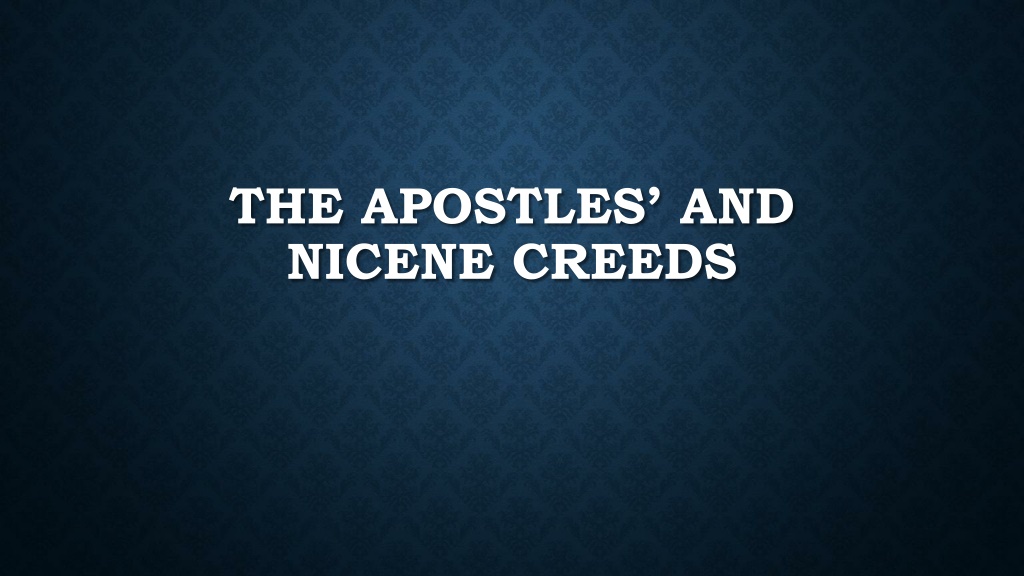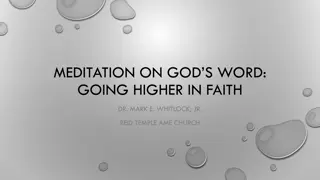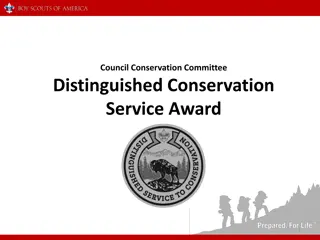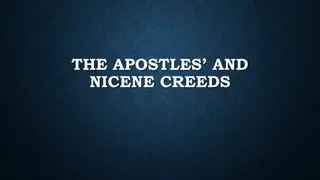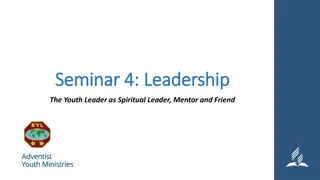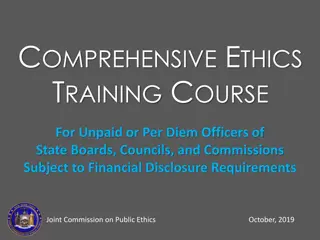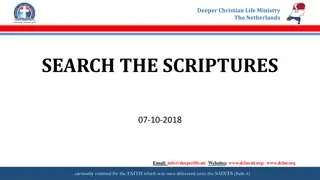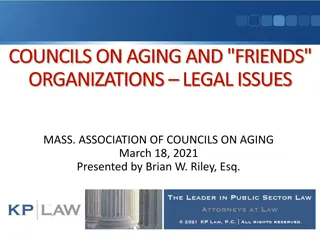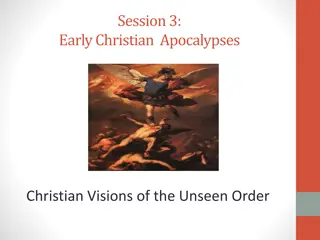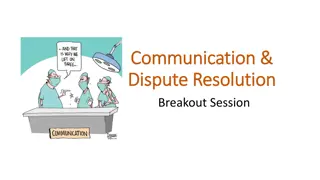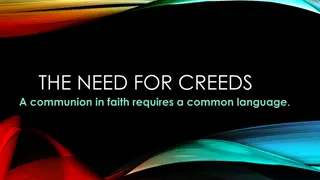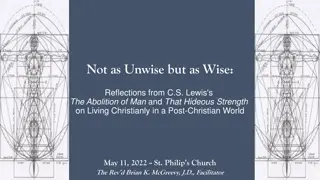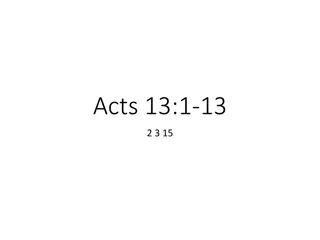Early Christian Creeds and Councils
Explore the Apostles' Creed, Nicene Creed, and historical context of Arianism through the Councils of Nicaea and Constantinople. Learn about the beliefs, controversies, and resolutions that shaped early Christian theology in this informative content.
Download Presentation

Please find below an Image/Link to download the presentation.
The content on the website is provided AS IS for your information and personal use only. It may not be sold, licensed, or shared on other websites without obtaining consent from the author.If you encounter any issues during the download, it is possible that the publisher has removed the file from their server.
You are allowed to download the files provided on this website for personal or commercial use, subject to the condition that they are used lawfully. All files are the property of their respective owners.
The content on the website is provided AS IS for your information and personal use only. It may not be sold, licensed, or shared on other websites without obtaining consent from the author.
E N D
Presentation Transcript
THE APOSTLES AND NICENE CREEDS
APOSTLES CREED I believe in God, the Father Almighty, Creator of Heaven and earth; and in Jesus Christ, His only Son Our Lord, Who was conceived by the Holy Spirit, born of the Virgin Mary, suffered under Pontius Pilate, was crucified, died, and was buried. He descended into Hell; the third day He rose again from the dead; He ascended into Heaven, and sits at the right hand of God, the Father almighty; from thence He shall come to judge the living and the dead. I believe in the Holy Spirit, the holy Catholic Church, the communion of saints, the forgiveness of sins, the resurrection of the body and life everlasting.
ARIANISM/COUNCIL OF NICEA I Arianism taught that Jesus was not God he was created and gifted with divinity. X Selective reading of Scripture, out of context X Ignored the prayer and worship of the Church since the time of the Apostles Emperor Constantine called a council (held in 325) to settle the matter, which only partially worked. Arianism continued to spread after the Council (boo) Councils often represent the beginning of a resolution to a particular crisis in the Church. Scott Hahn, The Creed
COUNCIL OF CONSTANTINOPLE I Some bishops and Roman nobility increasingly sided with Arius, errors continued to spread Emperors called a new council held in 381 Upheld Nicea : The consubstantiality and co-eternity of the three divine persons The taking of humanity of the Word, the Incarnation Distinctive, but one substance God is Trinity, Trinity is God Draws more from the Scripture
NICENE CREED I believe in one God, the Father almighty, maker of heaven and earth, of all things visible and invisible. I believe in one Lord Jesus Christ, the Only Begotten Son of God, born of the Father before all ages. God from God, Light from Light, true God from true God, begotten, not made, consubstantial with the Father; through him all things were made. For us men and for our salvation he came down from heaven, and by the Holy Spirit was incarnate of the Virgin Mary, and became man. For our sake he was crucified under Pontius Pilate, he suffered death and was buried, and rose again on the third day in accordance with the Scriptures. He ascended into heaven and is seated at the right hand of the Father. He will come again in glory to judge the living and the dead and his kingdom will have no end. I believe in the Holy Spirit, the Lord, the giver of life, who proceeds from the Father and the Son, who with the Father and the Son is adored and glorified, who has spoken through the prophets. I believe in one, holy, catholic and apostolic Church. I confess one Baptism for the forgiveness of sins and I look forward to the resurrection of the dead and the life of the world to come
NICENE CREED I believe in one God, the Father almighty, maker of heaven and earth, of all things visible and invisible. There is only one God, He is transcendent authority - omnipotence He is the first origin of all creation, including us, and we should prefer nothing to Him He is goodness and loving care He is a mystery, even when He reveals himself Eternally Father to the Son There is a bond between the visible (earthly things) and invisible (angels, saints)
NICENE CREED I believe in one Lord Jesus Christ, the Only Begotten Son of God, born of the Father before all ages. God from God, Light from Light, true God from true God, begotten, not made, consubstantial with the Father; through him all things were made. son of God is different from the Old Testament references Jesus is eternal, of the same being as the Father and to be worshipped Multiple references to describe the sameness as the Father Jesus participated in creation *Consubstantial is the key word homoousios in Greek
SCRIPTURE Mk 1:1 The beginning of the good news of Jesus Christ, the Son of God. 1 John 4:2 By this you know the Spirit of God: every spirit that confesses that Jesus Christ has come in the flesh is from God, Acts 13.33 he has fulfilled for us, their children, by raising up Jesus. As it is written in the second Psalm: You are my son; today I have begotten you. John 1:14 And the Word became flesh and lived among us, and we have seen his glory, the glory as of a father s only son,full of grace and truth. John 3:18 Those who believe in him are not condemned; but those who do not believe are condemned already, because they have not believed in the name of the only Son of God. Mission of Christ: Revelation 5: Christ is the slain Lamb of God; the conqueror
NICENE CREED For us men and for our salvation he came down from heaven, and by the Holy Spirit was incarnate of the Virgin Mary, and became man. For our sake he was crucified under Pontius Pilate, he suffered death and was buried, and rose again on the third day in accordance with the Scriptures. The mission of the Holy Spirit ordered and joined to that of the Son He sanctifies the womb of Mary for The Word to take on flesh God came to earth and became a man His purpose was the salvation of the world Jesus did not abolish, but fulfilled the Law of Sinai Again = anew or afresh, not in the sense of to have done again
NICENE CREED He ascended into heaven and is seated at the right hand of the Father. He will come again in glory to judge the living and the dead and his kingdom will have no end. Jesus humanity enters into God s heavenly domain Opportunity for all people to participate in the upward movement to glory right hand means the power to govern (ordering all creation) the inauguration of the Messiah's kingdom, the fulfillment of the prophet Daniel's vision (CCC 664) He is the Lord of all things and will pass judgement on all things, especially on The Last Day - Everyone is answerable to Him
DISCUSSION How does this impact your daily life? How do you live the Gospel because of the Creed? How can we use the creed for evangelization? What is the Kingdom of God? How is the Eucharist implied in the Creed?
NICENE CREED I believe in the Holy Spirit, the Lord, the giver of life, who proceeds from the Father and the Son, who with the Father and the Son is adored and glorified, who has spoken through the prophets. God is a Trinity,: Father Son and Spirit are one, distinct and inseparable He is Lord, the same divine word used for the Son The Word of God and His Breath are at the origin of the being and life of every creature (CCC 703) the Son is the one anointed by the Father s Spirit since his Incarnation ... Everything in the second chapter of the Creed is to be read in this light. Christ s whole work is in fact a joint mission of the son and the Holy Spirit. (CCC 727) The Spirit prepares for the time of the Messiah, never fully revealed
NICENE CREED I believe in one, holy, catholic and apostolic Church. Jesus endowed His community with a structure; The Church is the means and the goal of God s plan (CCC 778) Christ sanctifies the Church, making her holy Catholic means universal or in keeping with the whole Jesus is present in her, so she has the fullness He provides She is sent on mission by Jesus, called to bring all men into her fold no limits on geography, political, language separations Unity is the essence of the Church (CCC 813) Founded on the Apostles: Original witnesses sent on mission The Spirit keeps their witness true Apostolic succession through the pope and the college of bishops These are the Four Marks of the Church
NICENE CREED I confess one Baptism for the forgiveness of sins and I look forward to the resurrection of the dead and the life of the world to come The Church Militant, Suffering and Victorious are the communion of saints Baptism is the first and chief sacrament of the forgiveness of sins: it unites us to Christ, who died, and rose, and gives us the Holy Spirit. (CCC 985) The Church was given the power to forgive sins; the first gift after the resurrection All people will have physical bodies to live in eternity, glorified The end of the world is something to look forward too life everlasting will be a new world, in union with God. We already believe it, so we look forward to it coming to fruition and fulfillment.
THE OLD CREED VS THE NEW CREED We believe (CREDO)in one God, the Father, the Almighty, maker of heaven and earth, and all that is seen and unseen (visibilium omnium et invisibilium). He will come again in glory to judge the living and the dead, and His kingdom will have no end. We believe in one Lord, Jesus Christ, the only Son of God, eternally begotten of the Father, God from God, Light from Light, true God from true God, begotten, not made, one in Being (consubstantialem) with the Father. Through him all things were made. We believe in the Holy Spirit, the Lord, the giver of life, who proceeds from the Father and the Son. With the Father and the Son he is worshiped and glorified. He has spoken through the Prophets. For us men and for our salvation he came down from heaven: by the power of the Holy Spirit he was born of (incarnatus) the Virgin Mary, and became man. We believe in one holy catholic and apostolic Church. We acknowledge (Confiteor) one baptism for the forgiveness of sins. We look for the resurrection of the dead, and the life of the world to come. Amen For our sake he was crucified under Pontius Pilate; he suffered, died, and was buried. On the third day he rose again in fulfillment of the Scriptures; he ascended into heaven and is seated at the right hand of the Father.
IN LATIN CREDO in unum Deum, Patrem omnipotentem, factorem caeli et terrae, visibilium omnium et invisibilium. Et in unum Dominum Iesum Christum, Filium Dei unigenitum, et ex Patre natum ante omnia saecula. Deum de Deo, Lumen de Lumine, Deum verum de Deo vero, genitum non factum, consubstantialem Patri; per quem omnia facta sunt. Qui propter nos homines et propter nostram salutem descendit de caelis. Et incarnatus est de Spiritu Sancto ex Maria Virgine, et homo factus est. Crucifixus etiam pro nobis sub Pontio Pilato, passus et sepultus est, et resurrexit tertia die, secundum Scripturas, et ascendit in caelum, sedet ad dexteram Patris. Et iterum venturus est cum gloria, iudicare vivos et mortuos, cuius regni non erit finis. Et in Spiritum Sanctum, Dominum et vivificantem, qui ex Patre Filioque procedit. Qui cum Patre et Filio simul adoratur et conglorificatur: qui locutus est per prophetas. Et unam, sanctam, catholicam et apostolicam Ecclesiam. Confiteor unum baptisma in remissionem peccatorum. Et expecto resurrectionem mortuorum, et vitam venturi saeculi. Amen.
IMPORTANCE OF THE CREED According to St. Thomas Aquinas, there are FOUR good effects of our faith: 1. Through faith the soul is united to God, and by it there is between the soul and God a union akin to marriage (Hosea 2:20). 2. Eternal life is already begun in us; for eternal life is nothing else than knowing God 3. The right direction for our lives. The just man lives by faith (Hab:2:4) 4. By faith we overcome temptations. The holy ones by faith conquered kingdoms Heb. 11:33
DISCUSSION How is this true/not true? What you believe matters Do you think the changes in the English translation have helped people better understand our faith? Has learning about the creeds changed your understanding of God? The faith? How? What could be a modern heresy in relation to our understanding of what we are professing?
